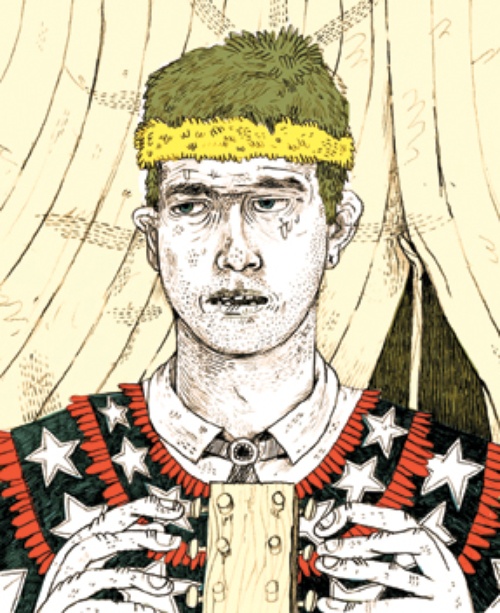
The Music We Hate: Sufjan Stevens
"There’s too much Sufjan in every Sufjan song. His Achilles heel—his Trojan calcaneus! his Pelean hoof!—is his penchant for excess."
Illustration by Josh J. Holinaty
Sufjan Stevens is one of the United States’ most gifted and mediocre contemporary songwriters.
The contradiction drives me crazy. His lyrics are laced with poetry, humour and drivel. He writes songs that are beautiful, catchy and swollen. He is a genius of timbre and harmony, but his most beguiling tunes become insufferable. And Stevens has no one but himself to blame. He is his own writer, arranger, engineer, producer and worst enemy.
The problem is that there’s too much Sufjan in every Sufjan song. His Achilles heel—his Trojan calcaneus! his Pelean hoof!—is his penchant for excess. What can be played in eight bars is always played for thirty-two; what can be told in two minutes is always told in four. You liked that melody on electric guitar? Let’s hear it on marimba! Liked it on marimba? Try chorale! And then marimba again! Although the same notes -cur and recur, this isn’t Steve Reich. Even on Stevens’ instrumental composition, The BQE, it’s maximalist minimalism—there’s no drone, no trance, just duplication.
Despite his gift for pop hooks, Stevens’ LPs are stuffed with turgid epics—songs six, seven and nine minutes long, like waterlogged corpses. Even short cuts can feel endless: listening to “Year of the Dog,” from 2001’s Enjoy Your Rabbit, the same three syllables repeat until you want to la da dum a hole in your head. The big picture is no better. Stevens’ studio albums have an average of 16.4 songs. If we include a compilation of Illinois outtakes (apparently twenty-one tracks was not enough!) and, unfairly, a 2006 Christmas set, that figure jumps to 20.7. No album needs 20.7 tracks. 20.7 should be against the law.
The same overload mars the Michigander’s lyrics. Stevens’ rhyming lists are elegant, with strings of landmarks and pretty proper nouns. But they also go on forever and, more damningly, they’re secretly banal. “City Hall, City Hall,” Stevens sings on a song from Michigan. “Windsor Park, Windsor Park. Saginaw, Saginaw. After dark, after dark.” Taken a little at a time, this logorrhea seems cute; taken together, it’s alphabet soup.
Sometimes Stevens half-acknowledges his musical bloat, with nod and wink, like a model with a beauty mark. Hence his lavish song titles, generally too long to cite, like the one I omitted in the paragraph above. Take track twenty-one on Illinois, forty-six seconds and utterly inessential, called “Riffs and Variations on a Single Note for Jelly Roll, Earl Hines, Louis Armstrong, Baby Dodds, and the King of Swing, to Name a Few.” Or another instrumental from the same album, cheekier still, called, “Let’s Hear That String Part Again, Because I Don’t Think They Heard It All the Way Out in Bushnell.” I wish I lived in Bushnell.
It’s not that Stevens is too precious. I like precious. But a joke gets less funny every time you hear it. When Stevens released Michigan and announced he would do the same for every state, I laughed. When he actually went ahead and released Illinois, I laughed a little less. It was the same punchline.
“I don’t really have as much faith in my work as I used to,” Stevens said last year. This is unfortunate. Sufjan Stevens doesn’t need to doubt himself more; he simply needs someone to slap him across the face. He needs an editor—someone to push back, to draw the line, to say “No.”
Sure, Stevens can arrange, engineer and produce everything himself, but that doesn’t mean he ought to. Partners don’t just make tasks easier—sometimes they make them more difficult. So this is the challenge I put to Sufjan: make things harder for yourself. Kill your darlings, sleep with the enemy. And put down the damn marimba.
Related on maisonneuve.org:
—The Music We Hate
—The Music We Hate: Online Supplement
—Born Here
Subscribe — Follow Maisy on Twitter — Like Maisy on Facebook





